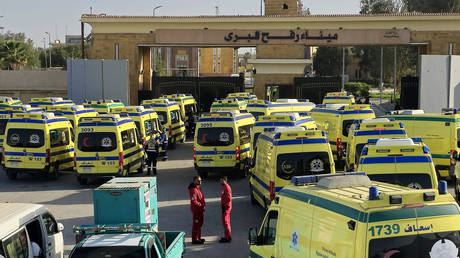
Tehran has provided tactical intelligence critical to Houthi strikes in the Red Sea, according to the White House
The United States has accused Iran of being “deeply involved” in attacks by Houthi rebels on commercial ships in the Red Sea. Tehran has provided drones and missiles to the Houthis, as well as tactical intelligence “critical in enabling” the strikes, the White House has said.
Since last month, Yemen’s Houthis have launched multiple drone and missile attacks on international shipping in the Red Sea, disrupting maritime traffic.
“We know that Iran was deeply involved in planning the operations against commercial vessels in the Red Sea,” White House national security spokeswoman Adrienne Watson said in a statement, adding that it is “an international challenge that demands collective action.” The White House has also said it is mulling additional actions to respond to the Houthis.
The group has claimed the attacks are in response to Israeli strikes in Gaza. The conflict in the Palestinian enclave escalated on October 7 when Hamas fighters attacked Israel, killing about 1,200 people and taking scores hostage. Israel’s retaliatory operation against Gaza, which Israeli officials say is aimed at wiping out the militant group, has left more than 20,000 dead so far, according to local health officials. The Houthis have pledged to continue targeting ships sailing close to Yemen as long as Israel continues its war on Hamas.
Iran has repeatedly denied involvement in attacks by the Houthis in the Red Sea. Foreign Ministry Spokesperson Nasser Kanaani stressed in early December that “resistance groups” are acting independently and “not taking orders from Tehran to confront the war crimes and genocide committed by Israel.”
On Wednesday, ex-National Security Advisor to Donald Trump and former US Ambassador to the United Nations, John Bolton, argued in the Washington Post that the administration of President Joe Biden was showing weakness in its treatment of the Houthis. Bolton also cited Iranian Foreign Minister Hossein Amir-Abdollahian, who recently told The New York Times that the US must face “consequences” for its support of Israel. However, White House National Security Council spokesman John Kirby said this week that the US would not “telegraph any punches one way or the other.”
Last week, the US announced a naval coalition of 20 mostly NATO countries to jointly patrol the Red Sea area in order to repel and respond to Houthi attacks. The strikes have disrupted a key trade route linking Europe and North America with Asia via the Suez Canal, and caused delays in deliveries and dramatically raised shipping costs as vessels are being forced to take alternative and longer routes.




